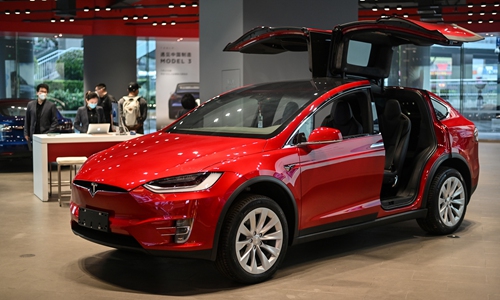
A car in a Tesla showroom in Wuhan, Central China's Hubei Province on April 18. Photo: AFP
An accident in Nanchong, Southwest China's Sichuan Province on Saturday involving a Tesla car killed two people and injured six, police said. The accident has raised concerns among netizens and experts about the popular US electric car brand's safety controls.
The car, driven by a 51-year-old woman, hit multiple vehicles and pedestrians on Saturday afternoon, resulting in two deaths, six injuries and several damaged vehicles, according to a statement released by the traffic police detachment of the Public Security Bureau in Nanchong on Saturday.
According to the statement, the driver was neither drunk nor under the influence of drugs.
A spokesperson at the Nanchong Public Security Bureau Traffic Police Detachment confirmed to the Global Times that it was a Tesla car that caused the accident without disclosing details. He said that the police are entrusting identification centers to investigate the actual cause of the accident, which will be made known to the public. The process will take about 20 days.
A video circulating on China's twitter-like Sino Weibo showed a Tesla car surrounded by broken glass and some damaged vehicles at the site. Some media reports said that it was a Model S that was involved.
The accident provoked discussion among Chinese netizens. Some blamed the driver, but others wondered why Tesla's autobrake function had not helped to prevent the accident.
Tesla cars have reportedly been responsible for several accidents in the past three months, according to a report from autoju.com. On August 17, a driver from Wenzhou, East China's Zhejiang Province, said his Model 3 suddenly sped up and rushed into a parking lot, damaging about a dozen cars. He also noted that the car's brake was not working. Another driver from Hangzhou reported in May that her Tesla once accelerated for no reason.
Tesla did not respond to an interview request from the Global Times on Sunday.
Domestic car analyst Feng Shiming said that perhaps the driver made a mistake, but there's also a chance that Tesla's driving system had some errors. Even hacker attacks of Tesla's electric control system may have been possible, he said.
"Although the cause of the accident is not clear, it's certain that Tesla has not been able to match its innovation with enough efforts to ensure the security of its electric cars or cope with security events, considering the frequency of its accidents," Feng told the Global Times.
"There have been at least six accidents related to Tesla's cars within three months. Tesla should give a timely and sincere response to the latest case, and bear customers' safety and public order in mind," he said.
"Supervision is also insufficient on the safety of electric cars in China," Feng added, urging authorities to make regulations to prevent electric carmakers from abusing customers' safety as many accidents have been reported in the new auto sector.




